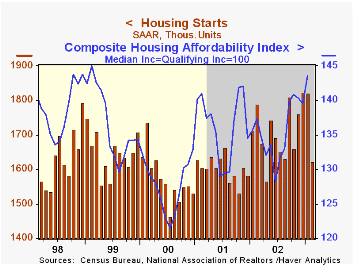 Global| Mar 18 2003
Global| Mar 18 2003Housing Starts Down
by:Tom Moeller
|in:Economy in Brief
Summary
Housing starts fell more than expected last month. Total starts fell a sharp 11.0% from a downwardly revised January level. Starts had been expected to decline to 1.75 mil. units. Single family starts fell 13.7% m/m from the near- [...]

Housing starts fell more than expected last month. Total starts fell a sharp 11.0% from a downwardly revised January level. Starts had been expected to decline to 1.75 mil. units.
Single family starts fell 13.7% m/m from the near-record January level. Severe winter weather likely depressed activity.
Multi-family starts rose a slight 1.9% following the steep 10.8% January drop. These starts have been moving sideways since 1997.
Building permits rose 0.4% following a 5.7% decline in January. Single family permits fell 6.8% after an unchanged January reading.
| Housing Starts (000s, AR) | Feb | Jan | Y/Y | 2002 | 2001 | 2000 |
|---|---|---|---|---|---|---|
| Total | 1,622 | 1,822 | -9.3% | 1,709 | 1,603 | 1,573 |
| Single Family | 1,295 | 1,501 | -12.0% | 1,364 | 1,273 | 1,232 |
| Multi Family | 327 | 321 | 3.5% | 346 | 330 | 341 |
| Building Permits | 1,786 | 1,779 | 1.1% | 1,717 | 1,639 | 1,598 |
by Tom Moeller March 18, 2003

Chain store sales rose moderately last week for the third consecutive week according to the BTM-UBSW survey.
The 0.4% gain last week lifted the month of March so far 0.5% ahead of the February average.
During the last five years there has been a 63% correlation between the year-to-year percent change in these monthly chain store sales and the change in retail sales of general merchandise, apparel and furniture (GAF, 26% of total retail sales). That correlation is comparable to the 69% correlation between Same Store sales as published by Redbook Instinet Research and GAF sales.
| BTM-UBSW (SA, 1977=100) | 3/15/03 | 3/08/03 | Y/Y | 2002 | 2001 | 2000 |
|---|---|---|---|---|---|---|
| Total Weekly Retail Chain Store Sales | 410.0 | 408.2 | 0.6% | 3.6% | 2.1% | 3.4% |
by Tom Moeller March 18, 2003

The Federal Reserve left the Federal Funds Target Rate unchanged at 1.25%, the lowest level since 1961. The decision was unanimous and as expected by most economists.
The discount rate remained unchanged with primary credit available at 2.25%.
The press release which accompanied the Fed’s action contained the following statement. "While incoming economic data since the January meeting have been mixed, recent labor market indicators have proven disappointing. However, the hesitancy of the economic expansion appears to owe importantly to oil price premiums and other aspects of geopolitical uncertainties. The Committee believes that as those uncertainties lift, as most analysts expect, the accommodative stance of monetary policy, coupled with ongoing growth in productivity, will provide support to economic activity sufficient to engender an improving economic climate over time."
On the balance of risks, the Fed indicated that "the Committee does not believe it can usefully characterize the current balance of risks with respect to the prospects for its long-run goals of price stability and sustainable economic growth."
Here is the complete text of the Fed's latest press release.
More analysis of the efficacy of US monetary policy from the Federal Reserve Bank of St. Louis click can be found here.
Tom Moeller
AuthorMore in Author Profile »Prior to joining Haver Analytics in 2000, Mr. Moeller worked as the Economist at Chancellor Capital Management from 1985 to 1999. There, he developed comprehensive economic forecasts and interpreted economic data for equity and fixed income portfolio managers. Also at Chancellor, Mr. Moeller worked as an equity analyst and was responsible for researching and rating companies in the economically sensitive automobile and housing industries for investment in Chancellor’s equity portfolio. Prior to joining Chancellor, Mr. Moeller was an Economist at Citibank from 1979 to 1984. He also analyzed pricing behavior in the metals industry for the Council on Wage and Price Stability in Washington, D.C. In 1999, Mr. Moeller received the award for most accurate forecast from the Forecasters' Club of New York. From 1990 to 1992 he was President of the New York Association for Business Economists. Mr. Moeller earned an M.B.A. in Finance from Fordham University, where he graduated in 1987. He holds a Bachelor of Arts in Economics from George Washington University.
More Economy in Brief
 Global| Feb 05 2026
Global| Feb 05 2026Charts of the Week: Balanced Policy, Resilient Data and AI Narratives
by:Andrew Cates






